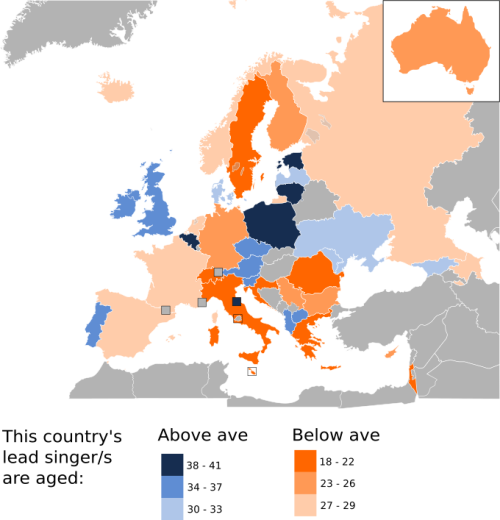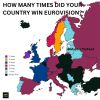Good afternoon, folks, and welcome to today’s Eurovision statistical map, which is all about age of lead singer/s representing each country this year. The dichotomy of youth versus experience is always interesting and it’s especially curious to find cultural and geographic trends regarding whether countries opt for younger or ‘older’ artists.
The average age of a lead singer this year is 29 years, 8 months - a marked increase on many previous years. This average has been pulled up by the presence of a much larger contingent than usual of artists aged 35+ - over a quarter of competing artists this year. It’s something I love to see, as realising a dream of being in ESC should be open to all ages.
I have divided the map into two colours for artists below and above the average age, with darker shades for the two extremes. I’m fascinated by trends crossing country borders, such as:
- all of the Nordics, except Denmark, opting for younger than averafe artists
- all the automatic qualifiers, except the UK, doing the same - but out of them, only Italy sending an artist from the youngest age bracket.
- the Mediterranean countries, with the sole exception of Portugal and Albania, all opting for younger than average artists
- the Baltics all sending older than average artists and the Balkans almost entirely sending younger than average artists.
- most of the older than average artists coming from a geographically contiguous strip going north-to-south from Estonia to Slovenia, and west to east from Austria to Ukraine
- How all the former USSR countries, excepting the Baltics, went for artists aged 29-33.
Of the top 10 currently in the bookies’ odds, only two (Lithuania and San Marino) have lead singers who are older than the annual average - and the top 5 has a much younger average age of 22.4, so it looks like we may have a younger than average singer winning for the third consecutive year. That being said, everything can happen from now until the grand final!
nuzzy liked this
lujxiv liked this
reality-in-fiction liked this
krawianna liked this
 disney-prince-quinn-hughes liked this
disney-prince-quinn-hughes liked this  vladkois liked this
vladkois liked this  maytheforcebewithyourfandom liked this
maytheforcebewithyourfandom liked this  meltedbuttertoast liked this
meltedbuttertoast liked this imheretofuckspiders liked this
 jesaispasdancer liked this
jesaispasdancer liked this blubblesss liked this
 sarcasticpuffin reblogged this from eurosong
sarcasticpuffin reblogged this from eurosong  yestodaysatan liked this
yestodaysatan liked this  sarcasticpuffin liked this
sarcasticpuffin liked this bookworm-2692 reblogged this from eurosong
bookworm-2692 liked this
 hafizhwk liked this
hafizhwk liked this theobsessedone liked this
zweedsanimatiepoppetje1 liked this
 crupt liked this
crupt liked this  helveticastandard reblogged this from mapsontheweb
helveticastandard reblogged this from mapsontheweb tinsnip liked this
bloodyandmysteriosalice liked this
catrchckern liked this
retrostow reblogged this from mapsontheweb
 jesmx5 liked this
jesmx5 liked this nonnyfcknawesome93 reblogged this from eurosong
leatherpearlslace liked this
dumnhpy liked this
askeataiho reblogged this from eurosong
 a-group-of-random-thots reblogged this from mapsontheweb
a-group-of-random-thots reblogged this from mapsontheweb  a-group-of-random-thots liked this
a-group-of-random-thots liked this  cactus-juice-lover reblogged this from mapsontheweb
cactus-juice-lover reblogged this from mapsontheweb  cactus-juice-lover liked this
cactus-juice-lover liked this elzelln said: Great that you have also included Australia, as we love competing at Eurovision. Not sure what will happen if we actually win.
emmenai-kalliston liked this
migata liked this
enibly liked this
arcticbunn liked this
eurosong posted this
Good afternoon, folks, and welcome to today's Eurovision statistical map, which is all about age of lead singer/s...
- Show more notes


![Countries participating in the Eurovision Song Contest 2016.
[[MORE]]Australia allowed to participate for a second year. Bosnia and Herzegovina, Bulgaria, Croatia and Ukraine are back after not taking part in 2015.
Andorra, Luxembourg, Monaco,...](https://64.media.tumblr.com/5860e8703dc5e00e39d1ea35cc3380e9/tumblr_nygj558Xpz1rasnq9o1_100.png)
![Eurovision Map with borders colored according to average vote points exchanged between neighbors.
[[MORE]]by georgegach:
This map visualizes some of the political issues with the Eurovision Song Contest, particularly highlights the patterns of voting...](https://64.media.tumblr.com/29d456be3f197239bf33fe3a5ab5feaa/tumblr_pn90waQlCB1rasnq9o1_100.jpg)





